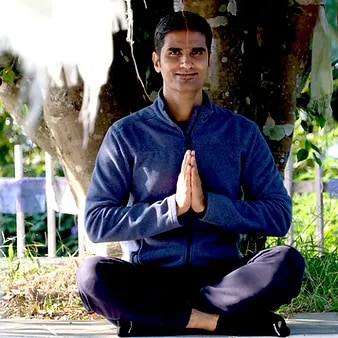Manomaya Kosha: The Mental Sheath of Human Consciousness
by Hardik Mehta

The yogic philosophy of Pancha Kosha describes five layers of human existence, each playing a vital role in shaping our physical, mental, and spiritual well-being. The third layer, Manomaya Kosha, is the sheath of the mind and emotions. It governs thoughts, feelings, and perceptions, influencing how we experience reality.
A well-balanced Manomaya Kosha is key to mental clarity, emotional stability, and self-awareness. In this blog, we will explore the significance of Manomaya Kosha, how it affects our lives, and practical ways to purify and strengthen it.
What is Manomaya Kosha?
The term Manomaya Kosha is derived from Sanskrit:
- Manas: Mind or thought process.
- Maya: Composed of or made up of.
- Kosha: Sheath or layer.
Thus, Manomaya Kosha refers to the layer made up of thoughts, emotions, and cognitive processes. It acts as an intermediary between our external experiences and inner self, shaping our perceptions, decisions, and reactions.
Importance of Manomaya Kosha
- Cognitive Functioning: It governs our ability to think, reason, and analyze situations.
- Emotional Regulation: Manages feelings such as joy, sadness, anger, and fear.
- Memory and Learning: Helps retain knowledge and develop understanding.
- Behavioral Patterns: Influences habits, desires, and reactions to life situations.
- Spiritual Growth: Acts as a gateway to deeper layers of consciousness and self-inquiry.
Signs of an Imbalanced Manomaya Kosha
When Manomaya Kosha is disturbed, it manifests in the following ways:
- Overthinking and Worry: Excessive mental chatter leading to stress.
- Emotional Turmoil: Mood swings, irritability, or heightened anxiety.
- Lack of Focus: Inability to concentrate on tasks.
- Negativity and Fear: Persistent pessimistic thoughts and emotional distress.
- Sleep Disturbances: Restlessness or insomnia caused by mental overload.
How to Balance and Strengthen Manomaya Kosha
- Meditation and Mindfulness
- Breath Awareness Meditation: Focusing on the breath helps calm the mind and reduce overthinking.
- Guided Visualization: Imagining peaceful scenarios to ease mental tension.
- Body Scan Meditation: Observing sensations in the body to develop mindfulness.
- Mantra Chanting: Repeating sacred sounds like ‘Om’ to quieten mental noise.
- Journaling and Self-Reflection
- Gratitude Journaling: Writing down things you’re grateful for shifts focus to positivity.
- Emotion Tracking: Recognizing and recording feelings to understand emotional triggers.
- Affirmations: Repeating positive statements to reprogram negative thought patterns.
- Yogic Practices for Mental Clarity
- Trataka (Candle Gazing): Improves concentration and stabilizes thoughts.
- Shavasana (Corpse Pose): Deep relaxation for mental rejuvenation.
- Bhujangasana (Cobra Pose): Enhances mood by stimulating the nervous system.
- Balasana (Child’s Pose): Relieves stress and promotes calmness.
- Pranayama (Breathing Techniques)
- Nadi Shodhana (Alternate Nostril Breathing): Balances the mind and enhances clarity.
- Bhramari (Bee Breath): Soothes anxiety and emotional turbulence.
- Ujjayi (Ocean Breath): Enhances mental focus and relaxation.
- Detoxing from Mental Clutter
- Limiting Digital Consumption: Reducing social media and news intake.
- Spending Time in Nature: Fresh air and greenery help reset the mind.
- Practicing Silence (Mauna): Regular quiet time to cultivate inner peace.
Role of Manomaya Kosha in Spiritual Growth
A purified Manomaya Kosha allows individuals to transcend limiting beliefs and access deeper wisdom. It paves the way for a conscious, aware, and intuitive mind, essential for higher spiritual practices like Jnana Yoga (path of wisdom) and Dhyana (meditation).
The Manomaya Kosha plays a crucial role in shaping our thoughts, emotions, and perceptions. A well-nourished mental sheath leads to clarity, peace, and self-mastery. By incorporating meditation, mindfulness, yoga, and breathwork into daily life, we can purify and strengthen this kosha, leading to a balanced and enlightened state of being.
If you’re looking to deepen your yoga practice and explore the Pancha Koshas further, consider enrolling in Sayujya Yoga’s 200-hour TTC program. It offers in-depth training on each layer of Pancha Kosha, focusing on mental and emotional well-being to cultivate a peaceful and resilient mind.
About the Author

Hardik Mehta
Hardik is an E-RYT 500 & YACEP (Yoga Alliance Continuing Education Provider), Yoga Alliance, USA. He has been practicing yoga for the last 9 years. Prior to finding his true calling in Yoga, he was working with various corporates for 12 years in the Retail and eCommerce sector.
